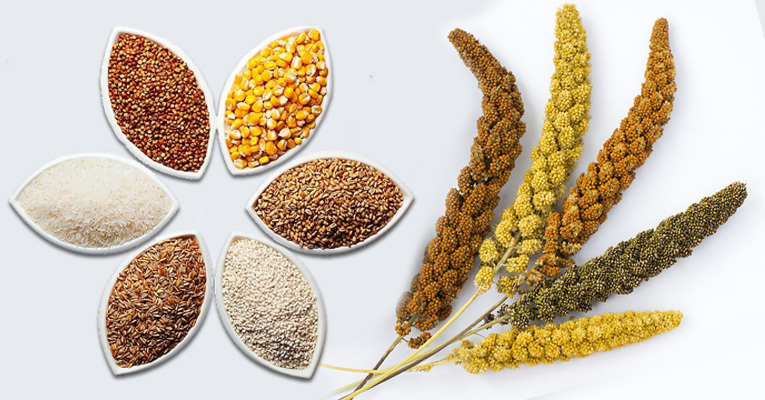Millets, cereal crops and tiny seed grasses, are a staple food in many Asian and African nations. They are small-grained, annual, warm-weather cereals that belong to the grass family. They have a similar nutritional makeup to other major grains and are highly resistant to drought and other adverse weather conditions.
For over 7,000 years, millets have been a staple food for people, and their potential contribution to the development of established farming civilizations and multi-crop agriculture cannot be underestimated. The maturation period for millet is remarkably short compared to that of wheat and rice, and its quick growth through Asia and into Europe is a result of this making it an ideal crop.
Nutritional Composition of Millets:
Millets are gluten-free and a healthy source of vitamins, protein, and fiber. Additionally, they offer numerous advantages for both physical and mental health. They are rich in dietary fiber and nutrients, and are a good source of protein, phytochemicals, and minerals.
Millets are high in dietary fiber, 7–12% protein, 2-5% fat, and 6–75% carbs. Compared to other cereals like corn, millet protein has a better essential amino acid composition. Less cross-linked prolamins are found in millet, which may contribute to millet's improved protein digestibility.
Types of Millets:
- Sorghum (Jowar)
In India, sorghum is frequently referred to as jowar. Jowar was traditionally used as a grain to produce rotis and flatbreads. Jowar, which is rich in iron, protein, and fiber, can help lower cholesterol levels because it contains a substance called policosanol. It is beneficial for those who are sensitive to wheat.
- Pearl Millet (Bajra)
Numerous health advantages of this millet have been documented. The daily consumption or incorporation of this millet helps you intake good amounts of iron, protein, fiber, and minerals like calcium and magnesium.
- Finger Millet (Ragi / Mandua)
Ragi is utilized as a nutritious alternative to wheat and rice. Ragi is unquestionably a nutritional powerhouse. This gluten-free millet, which is high in protein and amino acids, is beneficial for developing children's brain development.
- Foxtail Millet (Kangani / Kakun)
Foxtail millet, which is frequently found as semolina and rice flour, offers good blood sugar-balancing carbs. This millet's iron and calcium content aids in boosting immunity.
- Proso Millet (Cheena)
Blood sugar levels can be successfully balanced with the aid of this grain. Because of its low glycemic index, it is popular among weight watchers. It has been a popular bird food in India.
- Barnyard Millet (Sawa / Sanwa / Jhangora)
High fiber content in this nutrient-dense millet can significantly aid in weight loss. It is a high source of calcium and phosphorus, which aid in bone development and the prevention of bone illnesses.
- Little Millet (Kutki)
Little millets are excellent sources of B vitamins and minerals like calcium, iron, zinc, and potassium. These vital elements can help with weight loss. It is a healthy alternative to rice because of its high fiber content.
Health Benefits of Millets:
Good for people with heart conditions:
o Magnesium, which is present in millet, helps to control cardiac rhythm.
o Millet consumption may increase adiponectin levels, which can defend cardiovascular tissues.
o Millet contains vitamin B3, which is useful in decreasing oxidative stress and reducing risk factors for heart disease such as high cholesterol and triglyceride levels.
Reduces the risk of diabetes:
o Millets are rich in fiber and non-starchy polysaccharides, two classes of indigestible carbohydrates that aid in blood sugar regulation.
o Additionally, millets have a low glycemic index (GI), making them less likely to cause a spike in blood sugar levels.
Good for digestion:
o The fiber in millets supports digestive health and helps control bowel movements.
o Millets also contain prebiotics, which promote the growth of probiotics in the microbiome. This is essential for overall immune system and intestinal health.
o Furthermore, millets are gluten-free, making them highly beneficial for individuals with celiac disease or gluten intolerance.
Rich in antioxidants:
o The antioxidants found in millets may strengthen the body's defenses against oxidative stress, which is linked to disease and aging.
o These antioxidants may also reduce the risk of developing chronic diseases.
o Studies have shown that millet consumption can reduce oxidative stress in the hippocampus, and may have potential in the expression of Alzheimer's disease and dementia.
o Oxidative Stress may cause various chronic conditions, including neurodegenerative disorders, arthritis, and diabetes. Diet rich in antioxidants may protect against oxidative damage.
Helps lower cholesterol:
o The soluble fiber in millets causes the gut to produce a sticky material which ultimately traps lipids and lowers cholesterol levels.
Improves mood:
o Millets are high in the amino acid tryptophan, which may elevate one's mood.
o Tryptophan-rich foods can help alleviate symptoms of sadness and anxiety.
Millets may also have other health benefits such as:
- Suppressing the proliferation of cancer cells
- Facilitating wound healing
- Preserving bone health
- Promoting antibacterial and antifungal activities
According to research, using millet flour to make baked goods improves their nutritional profile by adding more antioxidants. Millet is also processed to create non-dairy probiotic beverages, pasta, and snacks. Fermented millet acts as a natural probiotic by providing beneficial bacteria to the body. Millets can be used in various dishes such as cookies, cakes, salads, side dishes, and porridge.
To purchase high-quality millets, visit https://flourpicker.com/products. To learn more about different types of grains and their health benefits, visit https://flourpicker.com.



















